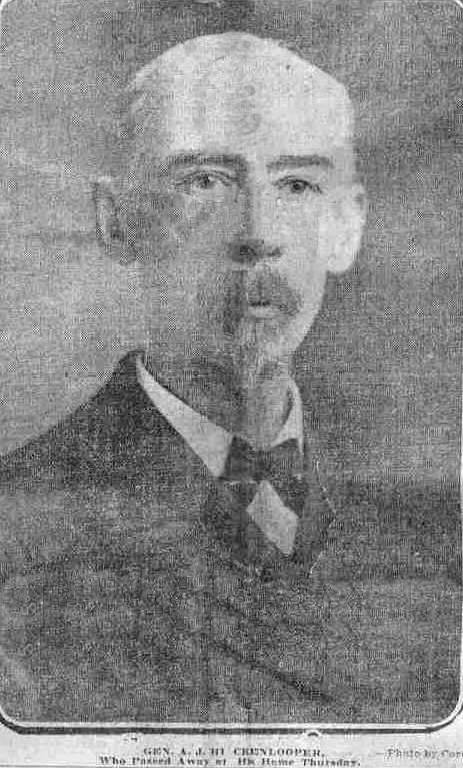Gen. Andrew J. Hickenlooper May 13, 1904

THE CINCINNATI TIMES-STAR
May 13, 1904
OBITUARY.
scans from newspaper
collection
of
Ruth
Adams-Battle
Transcribed by Dorothy Wiland

click image to view full size

GEN. A. J. HICKENLOOPER
Who Passed Away at His Home Thursday
Former President of the Gas and
Electric
Company Died,
After an Extended Illness.
He Had Long Been
Identified
Prominently With City
Affairs
and Had Served His
Country With
Distinction
in the Civil War
Gen. Andrew J.
Hickenlooper
died at 12?45 o’clock Thursday, after an exhausting illness, which had
lasted for months. At the time of his death the various members
of
his family were grouped about the bedside. Although the end had
been
anticipated for some weeks past, as apt to occur at any moment, his
death
was rather unexpected Thursday morning. That is to say, there
were
no indications in advance that dissolution was about to occur, and the
aged business man dropped into death as easily and gently as though he
had but gone to sleep.
For some months past he
had been trouble with a nervous exhaustion complicated by internal
troubles,
which finally forced him some months ago to retire from the presidency
of the Cincinnati Gas and Electric company, and devote himself to the
endeavor
to restore himself to health. He had been reluctant to leave the
important and responsible duties of his position, however until it was
too late and his ? had been drained of vitality. After leaving
the
position of president he remained at his home in this city for some
time
in the hope that a perfect rest would restore him in strength.
When
this failed he was taken to Baltimore, accompanied by members of his
family,
as it was believed that the balmier climate of the South would restore
him to complete strength. This hope, too, proved futile, and when
he returned to this city a few weeks ago, it was recognized among his
intimates
that he had but returned to die. The nature of his trouble was
such,
however, that the end was not a sudden one, and the former general of
finance
gradually wore out.
A few days ago his
family
was told by Dr. Dunham, the attending physician, to be prepared for the
worst at any moment. Dr. Dunham stated that the end might come at
any time, and that on the other hand the reserve strength which still
remained
from Gen. Hickenlooper’s once magnificent physique might enable him to
maintain the unequal struggle for weeks.
On Monday of this week
it was recognized that his strength was failing him more and more, and
that he might be expected to die at a moment’s notice. A careful watch
was kept in his sick-room, and when on Thursday, the premenatory
symptoms
of the inevitable end became apparent the members of his family were
grouped
about him.
The members of Gen.
Hickenlooper’s
family, who survive him, are his wife, Mrs. Maria Smith Hickenlooper,
three
daughter, Miss Anelia Hickenlooper, Mrs. Dr. J. M. Withrow, Mrs. Dawson
Blackmore, and two sons, Mr. Andrew Hickenlooper, and Mrs. Smith
Hickenlooper.
Mrs. Hickenlooper was before her marriage Miss Maria Smith, daughter of
an old and respected Cincinnati family. Gen. Hickenlooper and his
family are Presbyterians.
SKETCH OF LIFE OF GEN. HICKENLOOPER
General Andrew
Hickenlooper
was born in the village of Hudson, O., August 10, 1937. From his
earliest youth he displayed the qualities which afterwards made him a
noted
figure on the battlefield and later as a master of finance. When
he was but nineteen years of age he entered the office of A. W.
Gilbert,
then the city surveyor of Cincinnati, and so thoroughly mastered the
duties
of that responsible position that, three years later-In 1859—he became
the city surveyor himself. After spending two years in this
position
the Civil War broke out. Although he was but twenty-four years of
age, he recruited what was known as Hickenlooper’s battery, and joined
General Fremont at Jefferson City, MO. He was made chief of
artillery.
In 1862 his battery was made a part of General Grant’s army and took
part
in the thickest of the fight at Pittsburg landing. For gallantry
in action in that memorable battle he became commandant of artillery in
General McKean’s division. For his gallant services he was again
promised to be chief of artillery on General McPherson’s staff and
sustained
very intimate relations with that brilliant commander, finally becoming
chief engineer of the corps. It was after the battle of Port
Gibson
that General McPherson wrote to the Secretary of War, stating that, as
his further promotion; in the direct line of the artillery service was
impossible, he appealed to the general Government for substantial
recognition
of Captain Hickenlooper’s magnificent services. At the fall of
Vicksburg
the Board of Honor of the Seventeenth corps awarded him a gold
Medal.
He served through the Atlantic campaign with distinguished honor
participated
in the march to the sea, and in the campaigns of the Carolinas, and was
indorsed for brigadier general by General Sherman, Howard and Grant in
the most eulogistic terms. On May 20, 1865, be became a brevet
brigadier-general.
After the war he was appointed United States marshal for the Southern
district
of Ohio. Then he served two terms as city civil engineer.
While
in this office, he was made assistant to W. W. Scarborough, then the
president
of the Cincinnati Gas company, with the title of vice president.
He served as vice president but a short time before he was elected
president
of the company. In 1879 he was elected lieutenant governor of
Ohio
and declined a renomination in 1881. He served one term as
president
of the Cincinnati Chamber of Commerce.
Back to:
May
13, 1904 Index
©2003, 2004 by Linda
Boorom & Tina Hursh
![]()


